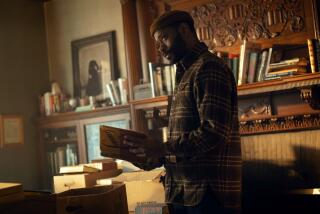A Poisonous Family Tree With Bad Roots : THE WONDER BOOK OF THE AIR by Cynthia Shearer; Pantheon $24, 309 pages
- Share via
Harrison Durrance’s trophies--his wife, mistress, two daughters, a son and a granddaughter--dangle grotesquely, like beads hung around a skeleton’s neck bones. In Cynthia Shearer’s multi-generational novel, the family tree trunk is poisonous, blighting and deforming the branches and twigs.
Each family member is given a different chapter to twitch in, although Harrison gets to speak twice and so does his sister-in-law, Adrienne, the book’s one uncontaminated character. The first chapter is related by Harrison as a child growing up in the Depression in the little central Georgia town of Alapaha. Succeeding chapters, while telling their own speakers’ stories, advance the history of the baleful male protagonist, and eddy in the emanations he gives off.
From a feisty and reasonably nice little boy who shines shoes at the railroad station--though he meanly notes the inferior location of a black shoeshine rival on the other side of the tracks--Harrison becomes a West Pointer. He flies combat missions in the Pacific, and then turns wife beater, martinet, drunkard and lecher at a succession of bases in the postwar Air Force.
He is allowed to resign after his flamboyant attempt to clean up corruption at one post backfires; also, he has entangled himself publicly with a fellow officer’s wife, Olivia. He retreats to Alapaha, where he makes life unpleasant for his wife and children before decamping to settle restlessly with Olivia, and dispense unpleasantness and charm from a distance.
Yes, charm. Shearer, who writes perceptively and has a good ear for speech and a good eye for the way people behave, is less good with the people who do the behaving. She has tried something ambitious with Harrison. He loves words, recites poetry, has one of those scrapey Southern whiskey voices that can make a person feel comfortable, wants things to go well, is often nice to little children, esteems the simple wartime virtues and hasn’t a clue about the peacetime ones.
The author seems to suggest that male awfulness is the price you pay for male goodness. Olivia explains to her sister that men come back from war “with something that neither you nor I have. All I know is that it makes women want to live.”
The trouble is that Shearer presents Harrison’s awfulness so appallingly that she is unable to make us believe much else. He breaks his wife’s jaw when she argues, withholds food money when he suspects disobedience, slaps around his son, Field, for touching his radio, and beats a daughter black and blue when she calls a police car to take her home after he gets wildly drunk at a restaurant.
At the same time, he is obnoxiously smarmy. He calls one brutal wife beating “not one of the finer periods of my life,” and deals out homemade adages and tags.
Fictional characters are put together out of contradictions, but Shearer hasn’t managed to assemble Harrison’s. He lies in pieces, out of different boxes. His awfulness is such that it makes it hard to sympathize with the need of the characters he has abused to reconcile themselves with him. Psychotherapeutic truths are not the same as fictional ones.
Adrienne, who rather likes him, stands out. She takes him as he is, has never let herself get close enough to be abused, and knows that the victim status of Marjorie, her sister and his wife, doesn’t excuse her self-pity and self-absorption. A nurse, Adrienne suffers agonies after a passionate affair with the head of her hospital, goes into a brief funk, recovers and lives into an independent old age, ignoring her bruises and finding eccentrically original ways to do good.
As for the rest of the family, under their elaborate and sometimes subtle detail, they are wisps and wimps. About halfway through the book a reader may experience a dull reluctance to be introduced to one more of the relatives and their twitchy troubles and low-spirited droops. It is remarkable that a book written with such considerable accomplishment can be so tedious.
More to Read
Sign up for our Book Club newsletter
Get the latest news, events and more from the Los Angeles Times Book Club, and help us get L.A. reading and talking.
You may occasionally receive promotional content from the Los Angeles Times.








